牛津译林版八年级下册Unit 2 Travelling Period 3 课件(共21张PPT)
文档属性
| 名称 | 牛津译林版八年级下册Unit 2 Travelling Period 3 课件(共21张PPT) | 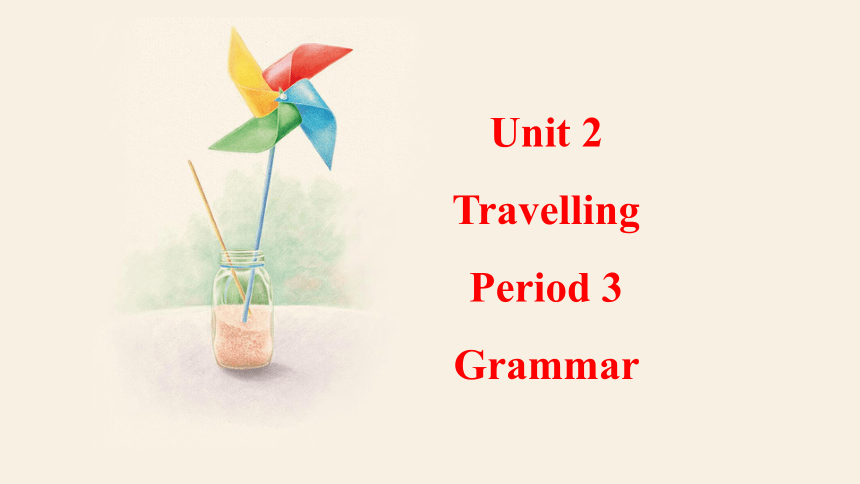 | |
| 格式 | pptx | ||
| 文件大小 | 434.9KB | ||
| 资源类型 | 教案 | ||
| 版本资源 | 牛津译林版 | ||
| 科目 | 英语 | ||
| 更新时间 | 2023-12-29 10:29:51 | ||
图片预览



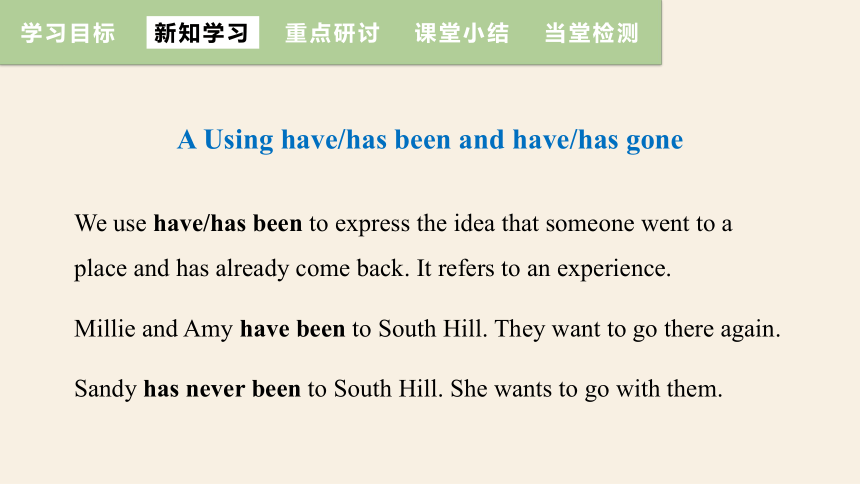
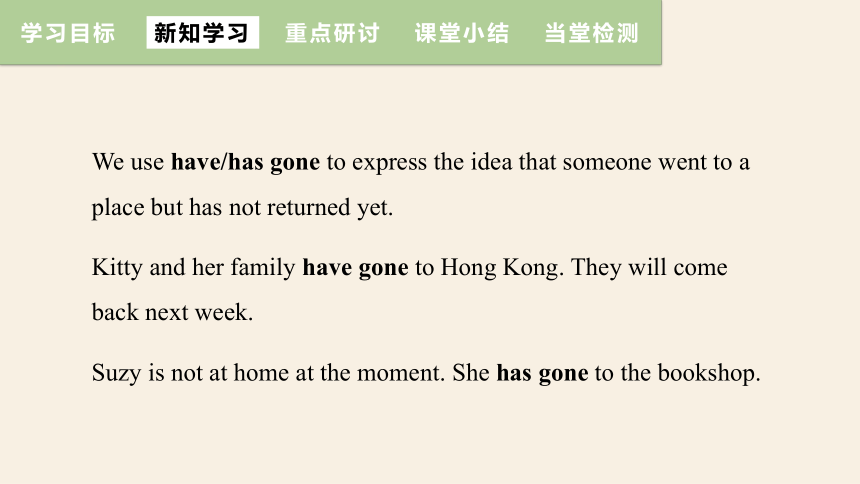
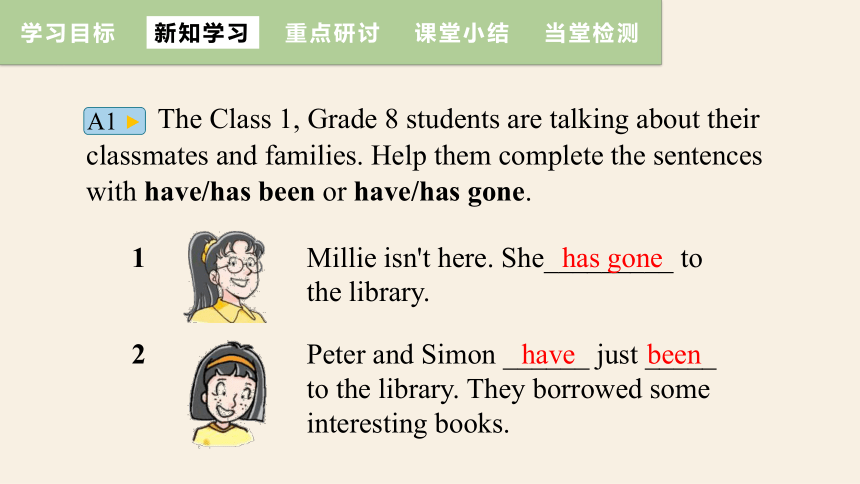
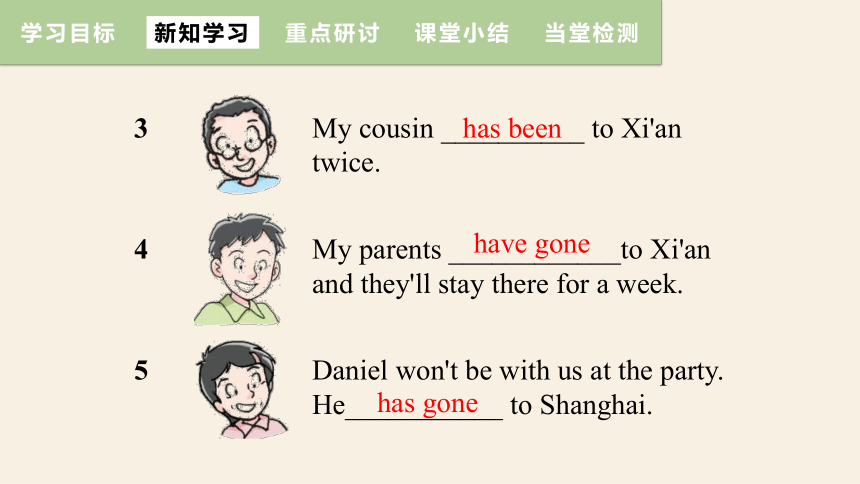
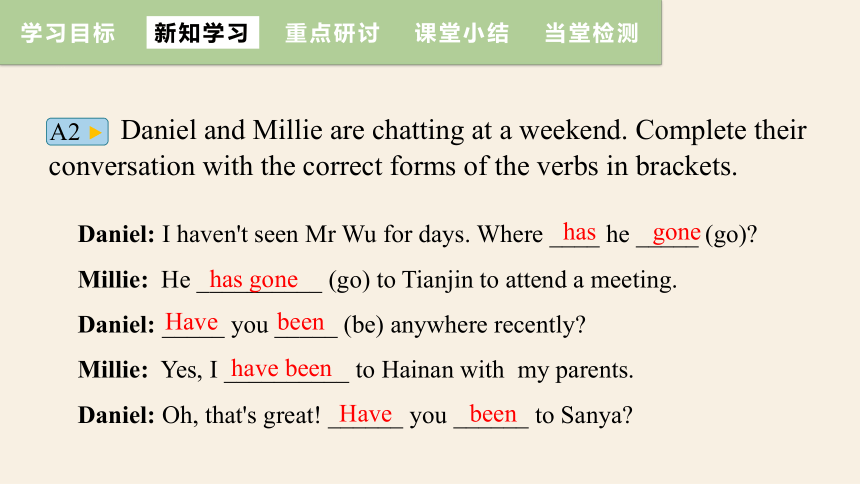
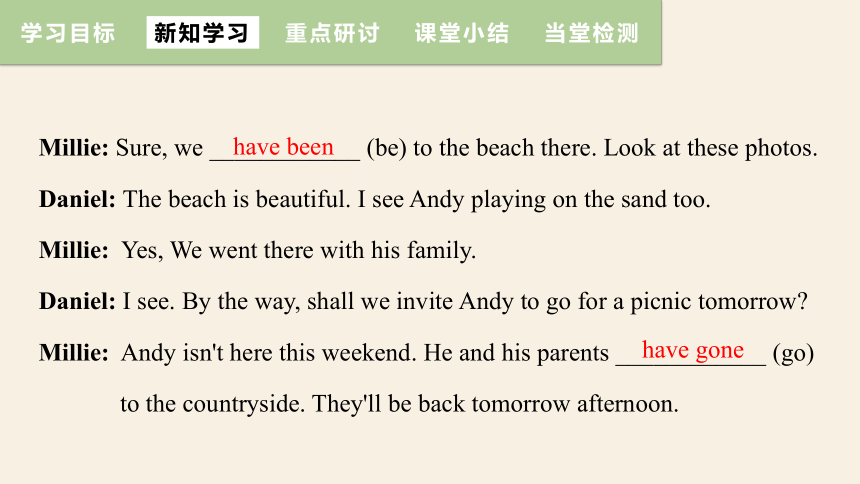
文档简介
(共21张PPT)
Unit 2
Travelling
Period 3
Grammar
新
课
导
入
Read and find
12/28/2023
1. I've been there before.
2. My parents and I have been in Hong Kong for two days.
3. I know you've gone to Hainan.
Language Goal
1. 能熟悉并正确运用本课时的重点单词和短语。
2. 能掌握have/has been和have/has gone的用法。
3. 能掌握现在完成时和for或since连用的动词。
新知学习
课堂小结
当堂检测
学习目标
重点研讨
新知学习
课堂小结
当堂检测
学习目标
重点研讨
A Using have/has been and have/has gone
We use have/has been to express the idea that someone went to a place and has already come back. It refers to an experience.
Millie and Amy have been to South Hill. They want to go there again.
Sandy has never been to South Hill. She wants to go with them.
新知学习
课堂小结
当堂检测
学习目标
重点研讨
We use have/has gone to express the idea that someone went to a place but has not returned yet.
Kitty and her family have gone to Hong Kong. They will come back next week.
Suzy is not at home at the moment. She has gone to the bookshop.
新知学习
课堂小结
当堂检测
学习目标
重点研讨
The Class 1, Grade 8 students are talking about their classmates and families. Help them complete the sentences with have/has been or have/has gone.
A1
▲
Millie isn't here. She_________ to the library.
Peter and Simon ______ just _____ to the library. They borrowed some interesting books.
has gone
have been
1
2
新知学习
课堂小结
当堂检测
学习目标
重点研讨
My cousin __________ to Xi'an twice.
My parents ____________to Xi'an and they'll stay there for a week.
Daniel won't be with us at the party. He___________ to Shanghai.
has been
have gone
has gone
3
4
5
新知学习
课堂小结
当堂检测
学习目标
重点研讨
Daniel and Millie are chatting at a plete their conversation with the correct forms of the verbs in brackets.
A2
▲
Daniel: I haven't seen Mr Wu for days. Where ____ he _____ (go)
Millie: He __________ (go) to Tianjin to attend a meeting.
Daniel: _____ you _____ (be) anywhere recently
Millie: Yes, I __________ to Hainan with my parents.
Daniel: Oh, that's great! ______ you ______ to Sanya
has
gone
has gone
Have
been
have been
Have
been
新知学习
课堂小结
当堂检测
学习目标
重点研讨
Millie: Sure, we ____________ (be) to the beach there. Look at these photos.
Daniel: The beach is beautiful. I see Andy playing on the sand too.
Millie: Yes, We went there with his family.
Daniel: I see. By the way, shall we invite Andy to go for a picnic tomorrow
Millie: Andy isn't here this weekend. He and his parents ____________ (go)
to the countryside. They'll be back tomorrow afternoon.
have gone
have been
新知学习
课堂小结
当堂检测
学习目标
重点研讨
B Verbs with for and since
We use for when we talk about a period of time, and we use since when we talk about a time point in the past.
Mr Dong has lived here for many years.
Mr Dong has lived here since he was born.
新知学习
课堂小结
当堂检测
学习目标
重点研讨
Some verbs, such as come, go, buy and leave, can be used in the present perfect tense, but they cannot be used with for or since in positive statements.
He has left Beijing for a week.
He has not left Beijing yet.
He has been away from Beijing for a week.
He has bought a car since 2007.
He has not bought any new car since 2007.
He has had a car since 2007.
×
√
√
×
√
√
新知学习
课堂小结
当堂检测
学习目标
重点研讨
If we want to express a continuous state, we can use another way like this:
Verb Used for a continuous state Example
begin/start have/has been on The film has been on for 20 minutes.
finish/stop have/has been over The parade has been over for hours.
come/go/ arrive have/has been in/at Kitty has been in Hong Kong for two days.
新知学习
课堂小结
当堂检测
学习目标
重点研讨
Verb Used for a continuous state Example
leave have/has been away She has been away from home since last Tuesday.
borrow have/has kept She has kept this book since last week.
join have/has been in have/has been a member of Simon has been a member of the Football Club since last year.
marry have/has been married They have been married for 15 years.
die have/has been dead The fish have been dead for some time.
新知学习
课堂小结
当堂检测
学习目标
重点研讨
Kitty is telling Millie about her holiday in Hong Kong on the plete what she says with the correct forms of the verbs in brackets.
▲
My parents and I _________(arrive) in Hong Kong on the first day of the winter holiday. We ____________(be) here for three days.
I __________(borrow) a book about Hong Kong a week ago. It's very useful. I _____ _____ (keep) it with me for a few days. It helps me learn more about Hong Kong.
Now it's noon and we're in Ocean Park. The first dolphin show _______(begin) at 11:30 a.m. It __________(be) on for about half an hour. The show is really exciting.
arrived
have been
borrowed
have kept
began
has been
新知学习
课堂小结
当堂检测
学习目标
重点研讨
have/has been和have/has gone的用法
我们用have/has been表示某人曾经去过某地,并且已经回来。如:
He has been to the Great Wall twice.
他曾经去过长城两次。
We have never been to South Hill.
我们还从来没有去过南山。
新知学习
课堂小结
当堂检测
学习目标
重点研讨
我们用have/has gone表示某人已经去了某地,但还没回来。如:
He has gone to London. He will be back in two weeks.
他已经去伦敦了。他将在两周后回来。
—Is Tom at home?
汤姆在家吗?
—No, he isn't. He has gone to the cinema.
不在。他去看电影了。
新知学习
课堂小结
当堂检测
学习目标
重点研讨
和for或since连用的动词
现在完成时常和for或since引导的表示一段时间的时间状语连用。如:
He has been away from China for two years.
他离开中国已有两年了。
He has lived in Nanjing since 2010.
自2010年以来,他一直住在南京。
注意:在带有一段时间状语的现在完成时的肯定句中,我们要用延续性动词,而不能有短暂性动词。
新知学习
课堂小结
当堂检测
学习目标
重点研讨
下面补充一些短暂性动词和延续性动词的转化参考:
短暂性动词 延续性动词 现在完成时构成
catch a cold have a cold have had a cold
buy have have had
open be open have been open
close be closed have been closed
fall ill be ill have been ill
fall asleep be asleep have been asleep
重点单词和短语:
sand, countryside, over, marry, dead, at the moment
have/has been和have/has gone的用法:
我们用____________表示某人曾经去过某地,并且已经回来;用____________表示某人已经去了某地,但还没有回来。
和for或since连用的动词:
当我们谈论一段时间时用_______,当我们谈论过去的一个时间点时用_______。
Unit 2
Period 3
新知学习
课堂小结
当堂检测
学习目标
重点研讨
for
since
have/has been
have/has gone
1. Class is _______ (结束) and students can go to play football.
2. Tom's parents have been _______ (结婚) for 15 years
3. My grandparents like to live in the ___________ (农村).
4. His little cat has been _______ (死的) for two days.
5. Look! Some children are playing on the s_______ (沙滩).
新知学习
课堂小结
当堂检测
学习目标
重点研讨
一、根据句意及提示完成下列句子。
over
married
countryside
dead
and
新知学习
课堂小结
当堂检测
学习目标
重点研讨
二、用所给单词的适当形式填空。
1. I have ever _______ (be) to Singapore three times.
2. —Is your father at home
—No, I'm afraid he ___________ (go) out.
3. The film ____________ (begin) for five minutes.
4. I just _____________ (clean) my room. It's clean and tidy now.
5. The old man _____________ (die) for ten years.
been
has gone
have been on
have cleaned
has been dead
Unit 2
Travelling
Period 3
Grammar
新
课
导
入
Read and find
12/28/2023
1. I've been there before.
2. My parents and I have been in Hong Kong for two days.
3. I know you've gone to Hainan.
Language Goal
1. 能熟悉并正确运用本课时的重点单词和短语。
2. 能掌握have/has been和have/has gone的用法。
3. 能掌握现在完成时和for或since连用的动词。
新知学习
课堂小结
当堂检测
学习目标
重点研讨
新知学习
课堂小结
当堂检测
学习目标
重点研讨
A Using have/has been and have/has gone
We use have/has been to express the idea that someone went to a place and has already come back. It refers to an experience.
Millie and Amy have been to South Hill. They want to go there again.
Sandy has never been to South Hill. She wants to go with them.
新知学习
课堂小结
当堂检测
学习目标
重点研讨
We use have/has gone to express the idea that someone went to a place but has not returned yet.
Kitty and her family have gone to Hong Kong. They will come back next week.
Suzy is not at home at the moment. She has gone to the bookshop.
新知学习
课堂小结
当堂检测
学习目标
重点研讨
The Class 1, Grade 8 students are talking about their classmates and families. Help them complete the sentences with have/has been or have/has gone.
A1
▲
Millie isn't here. She_________ to the library.
Peter and Simon ______ just _____ to the library. They borrowed some interesting books.
has gone
have been
1
2
新知学习
课堂小结
当堂检测
学习目标
重点研讨
My cousin __________ to Xi'an twice.
My parents ____________to Xi'an and they'll stay there for a week.
Daniel won't be with us at the party. He___________ to Shanghai.
has been
have gone
has gone
3
4
5
新知学习
课堂小结
当堂检测
学习目标
重点研讨
Daniel and Millie are chatting at a plete their conversation with the correct forms of the verbs in brackets.
A2
▲
Daniel: I haven't seen Mr Wu for days. Where ____ he _____ (go)
Millie: He __________ (go) to Tianjin to attend a meeting.
Daniel: _____ you _____ (be) anywhere recently
Millie: Yes, I __________ to Hainan with my parents.
Daniel: Oh, that's great! ______ you ______ to Sanya
has
gone
has gone
Have
been
have been
Have
been
新知学习
课堂小结
当堂检测
学习目标
重点研讨
Millie: Sure, we ____________ (be) to the beach there. Look at these photos.
Daniel: The beach is beautiful. I see Andy playing on the sand too.
Millie: Yes, We went there with his family.
Daniel: I see. By the way, shall we invite Andy to go for a picnic tomorrow
Millie: Andy isn't here this weekend. He and his parents ____________ (go)
to the countryside. They'll be back tomorrow afternoon.
have gone
have been
新知学习
课堂小结
当堂检测
学习目标
重点研讨
B Verbs with for and since
We use for when we talk about a period of time, and we use since when we talk about a time point in the past.
Mr Dong has lived here for many years.
Mr Dong has lived here since he was born.
新知学习
课堂小结
当堂检测
学习目标
重点研讨
Some verbs, such as come, go, buy and leave, can be used in the present perfect tense, but they cannot be used with for or since in positive statements.
He has left Beijing for a week.
He has not left Beijing yet.
He has been away from Beijing for a week.
He has bought a car since 2007.
He has not bought any new car since 2007.
He has had a car since 2007.
×
√
√
×
√
√
新知学习
课堂小结
当堂检测
学习目标
重点研讨
If we want to express a continuous state, we can use another way like this:
Verb Used for a continuous state Example
begin/start have/has been on The film has been on for 20 minutes.
finish/stop have/has been over The parade has been over for hours.
come/go/ arrive have/has been in/at Kitty has been in Hong Kong for two days.
新知学习
课堂小结
当堂检测
学习目标
重点研讨
Verb Used for a continuous state Example
leave have/has been away She has been away from home since last Tuesday.
borrow have/has kept She has kept this book since last week.
join have/has been in have/has been a member of Simon has been a member of the Football Club since last year.
marry have/has been married They have been married for 15 years.
die have/has been dead The fish have been dead for some time.
新知学习
课堂小结
当堂检测
学习目标
重点研讨
Kitty is telling Millie about her holiday in Hong Kong on the plete what she says with the correct forms of the verbs in brackets.
▲
My parents and I _________(arrive) in Hong Kong on the first day of the winter holiday. We ____________(be) here for three days.
I __________(borrow) a book about Hong Kong a week ago. It's very useful. I _____ _____ (keep) it with me for a few days. It helps me learn more about Hong Kong.
Now it's noon and we're in Ocean Park. The first dolphin show _______(begin) at 11:30 a.m. It __________(be) on for about half an hour. The show is really exciting.
arrived
have been
borrowed
have kept
began
has been
新知学习
课堂小结
当堂检测
学习目标
重点研讨
have/has been和have/has gone的用法
我们用have/has been表示某人曾经去过某地,并且已经回来。如:
He has been to the Great Wall twice.
他曾经去过长城两次。
We have never been to South Hill.
我们还从来没有去过南山。
新知学习
课堂小结
当堂检测
学习目标
重点研讨
我们用have/has gone表示某人已经去了某地,但还没回来。如:
He has gone to London. He will be back in two weeks.
他已经去伦敦了。他将在两周后回来。
—Is Tom at home?
汤姆在家吗?
—No, he isn't. He has gone to the cinema.
不在。他去看电影了。
新知学习
课堂小结
当堂检测
学习目标
重点研讨
和for或since连用的动词
现在完成时常和for或since引导的表示一段时间的时间状语连用。如:
He has been away from China for two years.
他离开中国已有两年了。
He has lived in Nanjing since 2010.
自2010年以来,他一直住在南京。
注意:在带有一段时间状语的现在完成时的肯定句中,我们要用延续性动词,而不能有短暂性动词。
新知学习
课堂小结
当堂检测
学习目标
重点研讨
下面补充一些短暂性动词和延续性动词的转化参考:
短暂性动词 延续性动词 现在完成时构成
catch a cold have a cold have had a cold
buy have have had
open be open have been open
close be closed have been closed
fall ill be ill have been ill
fall asleep be asleep have been asleep
重点单词和短语:
sand, countryside, over, marry, dead, at the moment
have/has been和have/has gone的用法:
我们用____________表示某人曾经去过某地,并且已经回来;用____________表示某人已经去了某地,但还没有回来。
和for或since连用的动词:
当我们谈论一段时间时用_______,当我们谈论过去的一个时间点时用_______。
Unit 2
Period 3
新知学习
课堂小结
当堂检测
学习目标
重点研讨
for
since
have/has been
have/has gone
1. Class is _______ (结束) and students can go to play football.
2. Tom's parents have been _______ (结婚) for 15 years
3. My grandparents like to live in the ___________ (农村).
4. His little cat has been _______ (死的) for two days.
5. Look! Some children are playing on the s_______ (沙滩).
新知学习
课堂小结
当堂检测
学习目标
重点研讨
一、根据句意及提示完成下列句子。
over
married
countryside
dead
and
新知学习
课堂小结
当堂检测
学习目标
重点研讨
二、用所给单词的适当形式填空。
1. I have ever _______ (be) to Singapore three times.
2. —Is your father at home
—No, I'm afraid he ___________ (go) out.
3. The film ____________ (begin) for five minutes.
4. I just _____________ (clean) my room. It's clean and tidy now.
5. The old man _____________ (die) for ten years.
been
has gone
have been on
have cleaned
has been dead
